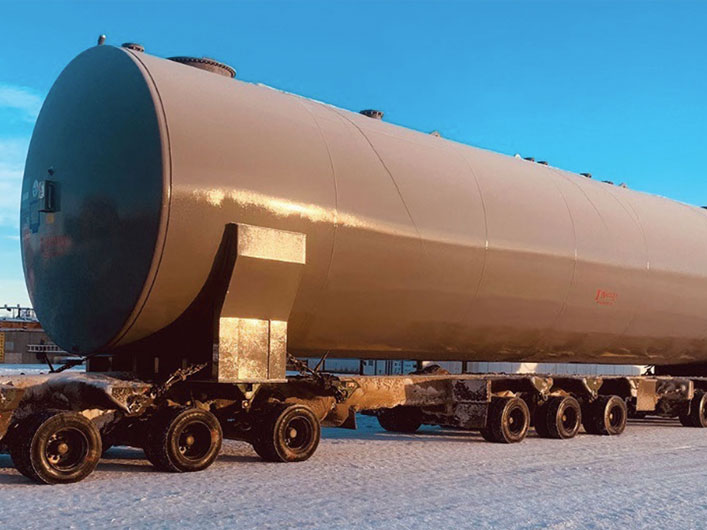As the dominant freight transport operator in Alaska, Lynden has decades of experience figuring out how to deliver goods to far-flung towns in villages spread out over vast territory. That’s centered on multi-modal transport — planes, barges, trucks — but also includes the recent development of such novel kinds of carriers as the Pistenbully Snowcat. (More about that in a bit.)
With the COVID-19 vaccine, distributing what’s needed and necessary has taken on critical significance. Lynden gives unquestioned precedence to delivery of the vaccines from Anchorage to remote locations in western Alaska, along with personal protective equipment for those administering the shots.
“Other cargo has been managed around the priority of the vaccines,” said Jon Burdick, Lynden’s CEO and president, in a telephone interview with American Journal of Transportation. “We’re faced daily with priority moves, but in this case, it’s life-critical and community-critical, so supporting community health is an opportunity to give back and we are grateful for that opportunity.”
Despite its geographic challenges, Alaska has tallied one of this nation’s best records for vaccine distribution. It ranked fifth as of April 11, fully vaccinating 26.64% of its 731,000 populace. “We’re proud to play a small role in helping to distribute the vaccines to remote communities,” said Burdick, who has been with Lynden for 40 years, and started with the company right out of college.
Lynden is based in Seattle, WA, and provides services in the northwestern US, as well as such far afield destinations as South Sudan. But at least half its business is centered in Alaska, business the company started more than 60 years ago when it became the first truck operator with service on the Alcan Highway. The privately owned company also operates a regular barge service from Seattle to Hawaii. It ranks among the top 100 truckers in the US, with revenues in 2020 just shy of $1 billion, slightly down from a year earlier. Lynden is unusual as well in its breadth of owned assets for delivery — everything from long-haul and full-truck-load to last mile and LTL. It is one of the few large multi-modal concerns. Its array of equipment includes not just trucks and barges, but C-130 Hercules aircraft and hovercraft.
As it did elsewhere, the pandemic itself introduced many challenges to the supply chain in Alaska, issues that continue to reverberate throughout the operations. The mix of goods changed, sometimes dramatically, as did those receiving them. While much of the trade-oriented economy has recovered, the pandemic continues to wreak havoc on some businesses.

Logistical Challenges
Most notably, Alaska’s tourism industry, which is a big economic driver, has been decimated. Cruise ships cancelled their sailings in 2020, and could well do so again this year. (Regulations require that cruise ships sailing from the US mainland to Alaska make a stop in Canada, which has banned the ships this year and CDC regulations so far prohibit operations.) This has hammered not just cruise ship depots, but everything that depends on the trade, from restaurants to curios shops. Lynden itself supports a lot of the major suppliers and retailers into the tourism business.
Project cargo is an important component of Lynden’s business and that’s changed as well over the past year. Oil fields cut back to essential personnel, new exploration and development projects put on hold and large industrial projects deferred. Some of that has been substituted by a surge in goods and supplies to support retail growth, such as home improvement, including lumber, Burdick reported, with both vessels and trucks making the shift. “The cargo to support those projects to some extent offset the slowdown in industrial activity,” he said.
In addition, Lynden must cope with the unusual nature of a lot of supplies delivery in Alaska, often low density and isolated. “Many small communities in Alaska are not connected to a highway supply chains and that introduces unique logistical challenges, it’s much different than the Lower 48,” said Burdick.
Just maintaining regular business during the initial stages of the pandemic wasn’t easy, but vital. As the pandemic unfolded, “our focus was really on keeping delivery routes open, supplies moving and communities having uninterrupted service,” said Burdick. “We provide a lifeline to many communities utilizing our barges, trucks and planes to remote destinations that few others go to. That was one of the key priorities.”
The Hawaiian economy has also been hard hit by a slowdown in tourism, although this was mitigated in part as well by a surge in home construction and remodeling, Burdick said. In 2020, Lynden boosted its Hawaii service as well. It expanded its fleet with the purchase of two high-capacity barges. The new barges each are 438 feet long, 105 feet wide and a deadweight capacity of 16,869 tons. They have increased capacity on the route by 35%. These vessels also enabled the carrier to shift terminals to a new location at Barber’s Point, Kapolei, HI, which, Burdick said, “offers more delivery efficiency for Hawaii customers,” as it’s closer to a large industrial park.
Customizing the Box
Lynden prides itself on equipment innovations and it has notched several over the past year or so. One involves the customization of marine containers, which, Burdick said, enables “features that are more common to highway trailers.” These include larger interior dimensions and a Kaptive Beam decking system, which is an adjustable, intermediate decking within a container. This enables pallets to be double stacked, without running the risk of crushing the cargo on bottom, and provides for much heavier payloads. They have proved popular on the Seattle-Hawaii run, he said.
Then, of course, there’s the PistenBully snow cats, which were originally designed for wintertime trail grooming, but which Lynden has modified to enable it to haul heavy payloads over snow-covered icy tundra in winter and spring. Last year, these machines moved more than one million pounds on the North Slope, including cement mixers, front-end loaders and a fire truck destined for Barrow Airport.





